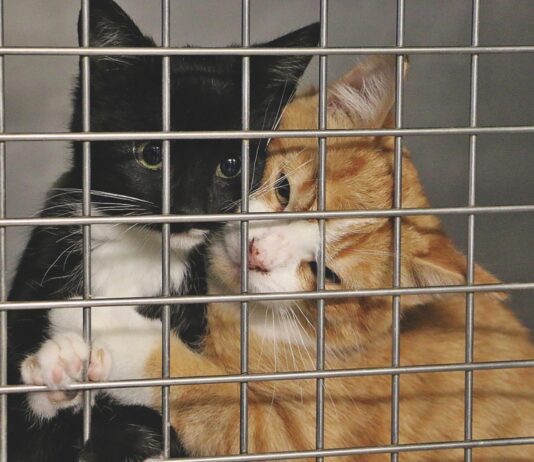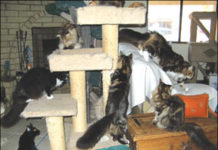Ten Ways to Go Green
It should come as no surprise that Mother Nature is on the verge of taking a permanent sick day. After all, harmful climate changes due to greenhouse gases, air and water pollution, and the destruction of natural habitats are putting our planet and its inhabitants - both two- and four-legged - in peril. Hopefully, many of us have begun to make some changes in our daily lives to help reverse the damage done to, well, everything. But what role can our cats play in being good stewards of our beleaguered planet? There are many practical ways to reduce your felines carbon pawprint, which include switching to a corn or wheat-based cat litter and recycling cat food containers instead of throwing them in the trash. Get a jump start on Earth Day (April 22) by incorporating the following tips into your daily routine. Start out slowly if you wish by trying one or two new tips each week. Encourage your friends, family members and co-workers to join in your quest for a sustainable future. Youll find that its not only fun and easy to "go green," but youll see that you can make a positive and lasting impact on our world, which will please Mother Nature.
Ask Elizabeth: 12/08
I do believe that CatWatch readers are the most kind-hearted souls on earth! Thank you for wanting to help these little creatures. Its very common for female cats to bring home prey. Mother cats will first bring home dead animals to their young kittens, teaching them to eat prey animals. When the kittens are a bit older, the moms will bring home wounded animals, and will show the youngsters how to kill. Its possible that Marley is attempting to teach you how to hunt. The best thing that you can do when presented with an injured wild animal is to call a licensed wildlife rehabilitator for advice and assistance. Many well-meaning people are especially tempted to keep baby animals and care for them at home. Keeping wild animals - except to transport them to a wildlife rehabilitator - is against state and federal laws for lots of reasons. Many wild animals, even tiny babies, can transmit diseases to humans or other pets. Diseases, parasites or injuries may be difficult to detect and to treat, and each species requires specialized care.
A Mother’s Love?
If anyone has learned to accept the empty nest syndrome, its the mother cat who watches her kittens leave one by one by at about 12 weeks or so - either through adoption or by wandering off to fend for themselves. So its interesting to see how mother cats and their kittens behave when they stay together in the same household. "The least amount of conflict occurs with cats that have been brought up together," says Katherine A. Houpt, VMD, the James Law Professor of Animal Behavior at Cornell Universitys College of Veterinary Medicine. "Feline siblings often become friends in the household." But staying together in a small area, such as inside a home, is not the usual course of events for adolescent cats, says Dr. Houpt. Friction can occur. There may be skirmishes for social ranking among cats, especially the males. Most of these conflicts involve some threatening posturing, but usually dont result in all-out fights. Eventually, one cat will probably assume an "alpha" position in the hierarchy, while the others become content to sit on a lower rung on the social ladder and maintain the peace.
Are Your Cats Compatible Companions?
Once upon a time, cats were considered to be solitary creatures. Since they hunted alone rather than in packs, it was assumed that they preferred to be alone. As it turns out, some cats do indeed avoid the company of others. Yet even more cats clearly choose to remain close to fellow felines. They snuggle and groom and maintain proximity even when there are plenty of comfortable, safe resting places nearby. Unfortunately, there is no reliable way to predict whether an individual kitten will mature into a cat that seeks rather than shuns companionship. When two kittens are adopted together, particularly when they are siblings, the expectation is that they will benefit from one another. Initially, most kittens do play together, groom one another and share a bed. Even as their second birthday passes, all may seem well.
Two’s Company Sometimes
Cats are naturally solitary creatures; in addition, they are also naturally independent and self-sufficient traits that we alter and/or suppress when we domesticate them. The idea of a second cat can be very alluring: "One cat is so entertaining and such a wonderful companion
two would be twice the fun!" Or, "I want to do my part to ease the burden on my local shelter and give one more cat a good home." These are common thoughts for cat owners and may, in fact, be true; however, the decision to add a second feline family member should not be taken lightly. A second cat can either add joy and companionship, or it can add strife and mayhem. Dr. Julia Albright, resident of animal behavior at Cornell Universitys College of Veterinary Medicine, states, "Cats may tolerate, but rarely enjoy the company of another cat. I see so many problems from people having too many cats, but shelters are so overcrowded with cats that I hate to deter people from providing good homes."
Two’s Company -Sometimes
Cats are naturally solitary creatures; in addition, they are also naturally independent and self-sufficient - traits that we alter and/or suppress when we domesticate them. The idea of a second cat can be very alluring: "One cat is so entertaining and such a wonderful companion … two would be twice the fun!" Or, "I want to do my part to ease the burden on my local shelter and give one more cat a good home." These are common thoughts for cat owners and may, in fact, be true; however, the decision to add a second feline family member should not be taken lightly. A second cat can either add joy and companionship, or it can add strife and mayhem. Dr. Julia Albright, resident of animal behavior at Cornell Universitys College of Veterinary Medicine, states, "Cats may tolerate, but rarely enjoy the company of another cat. I see so many problems from people having too many cats, but shelters are so overcrowded with cats that I hate to deter people from providing good homes."
Ask Elizabeth: 04/08
Dear Elizabeth, I have four cats in my household and one of them, Tabitha, has a tendency to chew and eat plastic. Ive caught her chewing on plastic bags that Ive carried in from the store, as well as items in the basement that are wrapped in plastic. I worry that she could choke to death or hurt herself somehow. Why does she do this? One of my other cats is aggressive and chases her. Tabitha is afraid and will not fight back; could her plastic obsession be stress-related? Any ideas of what I can do?
Making Introductions: Slow and Steady
Last months column outlined some pros and cons of adopting a second cat. There was no easy answer to give, of course. Some cats are social and seek the companionship of others. Other cats do not welcome the proximity of fellow felines. And many cats appear eager or at least willing to share, but only with certain individuals. Let us assume that you followed last months tips and found an ideal mate for your resident cat. The newcomer is calm, playful and friendly. He appears relaxed when gently handled, and does not hiss or growl at his neighbor cats. And so, you have enthusiastically brought him home.
Is Your Cat Lonely?
It seems that nearly every week, a concerned cat person asks me that question. It could be that one cat in the household has recently passed away. Sometimes, a person has a bit more love to give, and just wants to share her home with more than one cat. And most often, people who work long hours hope that by adopting another cat, the original cat wont need to spend those hours alone. Unfortunately, there is no simple answer to that seemingly simple question. For years, we described cats as asocial. They hunt alone, so it was assumed that they lived alone and wanted to keep it that way. Research has revealed that, indeed, some cats are not very social. They are loners and do not choose to spend their time in the company of others.
A Feline Mystery
You walk into a room and see a little wet spot on the floor, far from any sink or faucet. Or perhaps you find a more solid surprise. Who was responsible for this deposit? If you have ever lived with more than one pet at a time, then you have surely been in this position. Your assignment: to solve The Mystery of the Puddle. Was it the dog? Was it the cat? And if you live in a multicat household, which cat did the deed?
Ask Elizabeth: 10/07
It all started innocently enough, when he started feeding the strays in the neighborhood and took in a pregnant cat, which soon gave birth to six kittens. Then the neighbors started coming to him with stray kittens they found. He meant to find them all homes of their own, but good homes were hard to find. Now, he has so many cats that he cant afford to have them neutered (which means the population has been growing astronomically). Theyre not receiving any medical care, so some of them are sick, and its all he can do just to feed them each day. The neighbors are trying to have him evicted and I cant say I blame them. I dont know how to help him, but I do know something needs to be done!
Which Cat Is the Culprit?
What is your first thought when you come home from work to discover that something in your house has been damaged perhaps by one of your cats? You may wonder, "Who created this mess?"

















